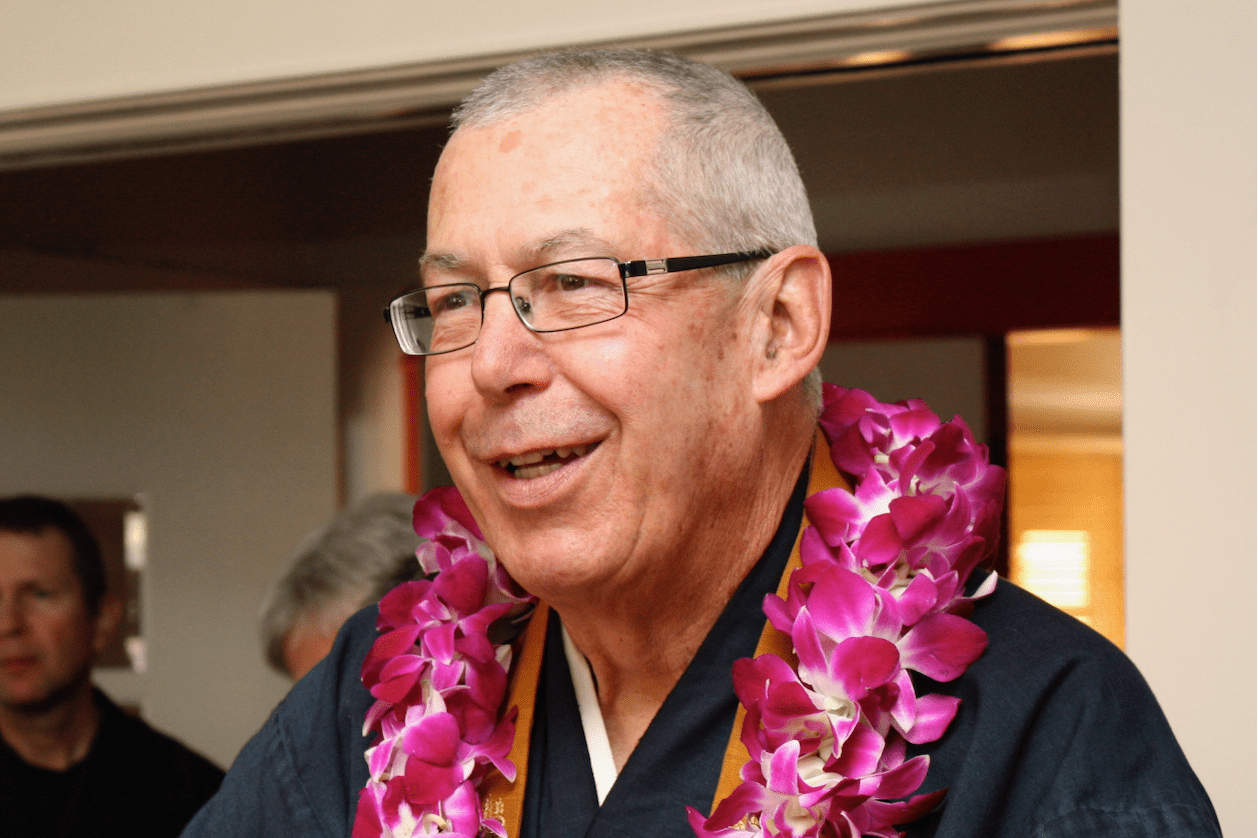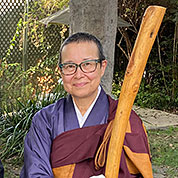
Remembering Sensei Koan
March 7, 2025
 by Wendy Egyoku Nakao
by Wendy Egyoku Nakao
My Dharma disciple Sensei Koan Myogen was a tall upright tree of Buddhadharma. He spread Dharma seeds whenever and wherever he could. When offering oak leaves from the ground at my home altar for him, I thought how very much like an oak tree he was—strong, steadfast, and generous, freely planting acorns.
Gary Janka began his Zen Practice at ZCLA in March of 1973 as a result of a talk given at the University of California at Santa Barbara by John Daishin Buksbazen. Residing at the time in Santa Barbara, Gary commuted to ZCLA at least once a month for interview, sesshin and special events and sat with Flora Eko Courtois’ Santa Barbara sitting group. Over twenty years later, both Gary and Daishin became members of my first Zen Teachers’ Circle.
In 1982, Gary took Jukai from the Venerable Taizan Maezumi Roshi, receiving the name “Kōan”—Kō (ease, peace) An (contented, peaceful). In 1998, I gave him Tokudo (Priest ordination) and assigned him to serve as Shuso (Head Monk) from 1999 to 2000. In 2003, Kōan moved to the Zen Center as a full-time resident for intensive Zen practice. By this time, his three sons were grown and he had retired from a full, forty-five year career in management and organizational work, which included having his own organizational consultant company. He had completed a Doctor of Philosophy in Human & Organizational Behavior from the University of California at Santa Barbara. In addition, Koan had spent a year as the General Manager of the Upaya Zen Center in Santa Fe, New Mexico, and two years as the Executive Director of the Peacemaker Community under Roshi Bernie while the latter was based in Santa Barbara. He later helped ZCLA develop its Core Values, which is in use today.

Sensei Koan receives the shippei (the “six foot black snake”) from Roshi Egyoku during his Shuso in 2000.
I was struck by the courage it took to undertake residential Zen training at age 60, a training which inevitably surfaces one’s emotional and psychological shadows. Koan was an old-school machismo at a time when women themselves were developing their voices and demanding a different kind of interaction. It was also a time when a less hierarchical leadership was emerging at ZCLA. He served as the Resident Steward and Co-Steward of the Zendo, positions which force one to confront deeply held habitual patterns and open to new ways of seeing. Resident training was a jarring experience for him in many ways.
Throughout it all, Koan tackled any task that needed doing—he was practical, competent, and a “let’s get it done” type of person. Upon his passing, one of our members wrote: “Just to be in his presence was a teaching, specially when he swept the floors, for some reason it made me so happy.” Others said, he had “such a steady presence and warm-hearted soul,” and many reflected on his kindness. Another commented that “Koan offered … such kindness, patience, and care when I was a (young bumbling) resident and his neighbor, including the time he heard me drive in to ZCLA and quietly said, ‘Sounds like you need a new muffler.’ He was correct, as it turned out, I was grateful for this and other moments of Zen fathering.”
Koan had a passion for the underdog which came through in his devotion to his volunteer chaplaincy among the incarcerated. He was the Steward of the Zen Center’s Angulimala Prison Circle, a small group of volunteers who served as Buddhist Chaplains in the Los Angeles County Jails and the California Men’s Colony in San Luis Obispo. One time, however, his fervent belief in redemption blinded him to the consequences of his actions. He unilaterally decided that he wanted to house a released child molester at ZCLA. This situation became a crisis from which we all developed a deepening practice of the Three Tenets as leadership and community portals for wisdom and compassion. There were bitter lessons for Koan and he took his medicine whole, resigning as then Board President and taking a leave of absence at his own initiative. The Sangha and I held space for him, and he eventually returned and completed his studies and resumed his prison chaplaincy.
He received Denkai in July of 2006 and became a Dharma Holder in August of the same year. On the 16th of October 2010, he received Dharma Transmission (Denbo) from me and received the transmission name “Myo (Subtle) Gen (Mystery).” From 2014 – 2019, Sensei Koan returned to Santa Barbara and founded the Santa Barbara Zen Center, serving as the Head Teacher and Officiating Priest. During these years, he achieved his goal of building the Sangha and continued his prison chaplaincy, nurturing many. He maintained strong vows, always with the underlying attitude of “Nine full bows of gratitude to all my teachers and Ancestors!”

Roshi Egyoku giving Sensei Koan a beautiful lei.
In his spare time, Sensei Koan planted and cared for trees, mostly in the public domain. He served as a Volunteer Forester for the Santa Barbara City Parks Department, caring for a fifty-five acre open space. Among the Sangha, he is known for the many trees he planted and maintained in the Zen Center’s Koreatown neighborhood. Many of us joined him in tree watering, wielding five-gallon water bottles in a cart, watering the winter pear blossoms, cork and pepper trees, golden shower trees and the like which he planted along the streets around ZCLA and existing trees whose care he adopted. I often wondered if the City ever noticed the many new trees which appeared throughout the neighborhood.
Koan developed Parkinson’s dementia which took its course over five harrowing years. When we spoke of his diagnosis, he was matter-of-fact, accepting, and with characteristic practicality, made plans to relinquish responsibilities at the Santa Barbara Zen Center. Upon his passing, a good friend of mine said, “Dementia is the ultimate letting go…it was a deep exploration for him.” A few days before Sensei Koan died, his Dharma brother Roshi Shogen sent me a photograph of a gift of calligraphy of the “Identity of Relative and Absolute” that I had made for Koan during his Denbo, now framed and hanging above his bed. I am sure he was held by Buddhaharma, just as he was held by many persons, especially by his devoted wife Genji and his good friends Roshi Shogen and his wife Karla. Witnessing their devotion over these difficult years, I often reflected how each of them simply went “the way of the Buddhas.”
When Sensei Koan passed, I felt an intense release of energy. As I was setting up the 49-day altar for him, Koan appeared to me. Rubbing his hands together with great energy, he said, “Roshi, let’s set up your sitting space.” For the past several years, I struggled to find a suitable sitting space in my new home. At one point, there were plans to build a Zen hut in the garden, but that fell through along with many other ideas. I was discouraged. Now suddenly, here was Koan, saying, “Let’s do this!” In a flash, I saw my sitting space. I asked Eberhard to help me and, within a short while, furniture was moved, a table stabilized and there it was: a marvelous tan for zazen between my everyday altar and my ancestral altar. For days I felt the joy of his release and his enduring passion for the Buddhadharma. Sitting and chanting for him, I felt that he had gifted me again the practice that we have shared for so many years. His “come on, let’s do this” was affirmative of his generosity and kindness.
When I remember my disciple Koan Myogen today, I feel the warmth of his kindness and the glow of his vows. I marvel at the many acorns he planted, including creating ZCLA’s Endowment Fund with a bequest from his parents. He was determined that ZCLA would continue long into the future. May it be so. May the Buddhas and Bodhisattvas protect him and guide him forever.
Roshi Egyoku is the Senior Dharma teacher at ZCLA.
